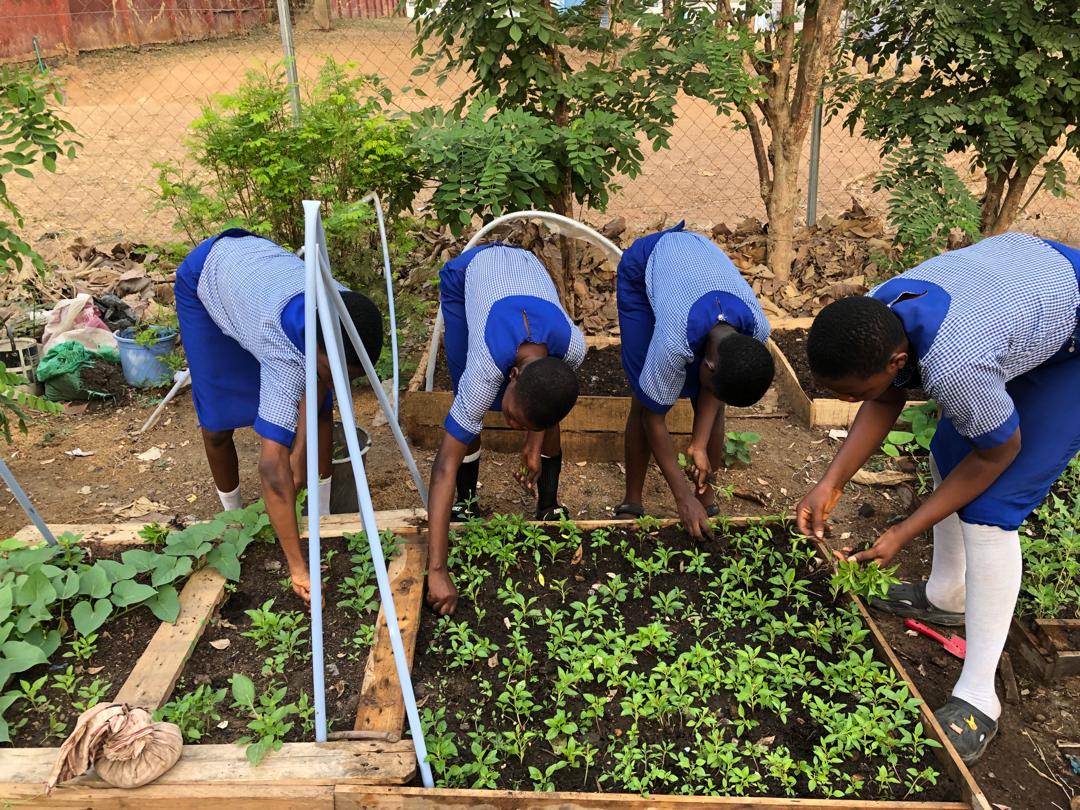In the heart of Akobo, a once-overlooked dumpsite at Estate High School has been transformed into a flourishing garden. This green classroom is not just about cultivation but also about community, learning, and sustainability.
This transformative project, led by Olajumoke Racheal and her team of dedicated agricultural science teachers, was initiated to bridge the gap between theoretical agricultural studies and real-world farming practices.
The decision to embark on the garden project was rooted in a desire to breathe new life into the study of agricultural science. Recognising the limitations of a purely theoretical approach, Racheal, with the support of her colleagues; Mr Oyaniyi, Mrs Morakinyo and others, sought to provide students with an immersive experience —one that would allow them to engage with the principles and practices of agriculture. Thus, the garden was conceived as a living laboratory, where students could dig their hands into the soil, explore the wonders of nature, and witness firsthand the lessons taught in textbooks.
The goal was clear: to break away from the rigidity of theoretical lessons and immerse students in the physical, enriching experience of tilling, planting, and nurturing plants.
Advertisement
The chosen location for this venture was nothing short of challenging. The garden, once a neglected dumpsite, needed to be tilled, cleared and filled up with good soil which now yields an array of fresh fruits and vegetables that are savoured by students, teachers, and members of the community alike. From crunchy carrots to juicy tomatoes, each harvest is a testament to the hard work and dedication of all those involved in the project.
This dramatic change not only rehabilitated a piece of land but also showed students the powerful impact of human intervention on the environment.
As the garden began to thrive, so did the educational opportunities. Students engaged in growing a variety of foods which have been occasionally shared with the students, teachers and community, providing a taste of what young hands can grow with dedication and care.
Advertisement
Another significant boost for our garden project came through the involvement of Slow Food International, through garden training sessions and the Negroni grant. This funding, secured in partnership with the Building Nations Initiative (BNI)—a youth-focused organisation dedicated to community development- gave us the necessary leverage to expand our garden and enhance its productivity and output. Additionally, the partnership afforded us valuable human resources and support from the youth organisation, further underscoring the immense benefits and transformative power of effective collaboration.
Additionally, the learning extended beyond agricultural skills. The garden became a dynamic venue for teaching important life skills such as teamwork, leadership, and responsibility. Students took on roles in administration, marketing, and management of the garden’s produce. They were involved in hands-on activities like making cages for plant protection, maintaining gardening tools, and other tasks vital for the garden’s upkeep. These activities not only strengthened their understanding of agriculture but also fostered a sense of community and cooperation.
Encouraged by the success at Estate High School, there is now a plan to replicate this model in about 10 other secondary schools across Ibadan. This expansion aims to offer more students the practical experience of agricultural science, potentially guiding them towards future careers in the field. By doing so, the project hopes to inspire a new generation of agriculturists who are not only skilled in modern farming techniques but are also aware of and involved in solving environmental issues.
One of the overarching goals of the garden project is to promote community sufficiency and environmental sustainability. By fostering biodiversity and teaching students about organic farming practices and the importance of preserving indigenous plant varieties, the project contributes to broader ecological health. These practices help combat the global climate crisis and protect local agricultural heritage from the encroaching prevalence of hybrid and GMO products.
Advertisement
As students dig, plant, and harvest, they are not just learning about agriculture; they are discovering their role in shaping a world where people and the planet thrive in harmony. The Estate High School garden project is not just a plot of land; it is a living classroom, a vibrant community hub, and a symbol of hope for a greener, more resilient future. A living example of how education can transform lives and landscapes.
It is a place where students don’t just grow plants but grow their futures, contributing positively to their community while learning to respect and preserve the environment. The project, which began as a modest attempt to bring life back to a forgotten space, has grown roots that now reach deep into the heart of the community and beyond.
Views expressed by contributors are strictly personal and not of TheCable.
Add a comment






